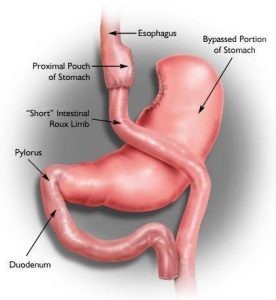Procedures Offered At UNC
Bariatric Surgery is the clinical term for weight-loss procedures. Procedures may use two approaches to help patients lose weight and improve or resolve associated conditions: Restrictive procedures, which create a small stomach pouch to make you feel fuller more quickly, and a combination of Restrictive and Malabsorption procedures, which, in addition to creating the small stomach pouch, also creates a bypass allowing ingested food to skip part of the small intestine, resulting in less absorption of calories and nutrients.
 |
Roux-en-Y Gastric BypassIn this Restrictive and Malabsorption procedure, the surgeon creates a small stomach pouch and then constructs a “bypass” for food. The bypass allows food to skip parts of the small intestine. By skipping a large part of the small intestine, the body cannot absorb as many calories or nutrients. Gastric bypass can be done through small incisions (the minimally invasive approach, also known as laparscopic surgery), or as an open procedure through an upper abdominal incision. |
 |
Vertical Sleeve GastrectomyVertical sleeve gastrectomy is a Restrictive procedure. The amount of food you can eat after surgery is restricted because a thin tube, or “sleeve” will be created from your natural stomach opening to the natural stomach outlet along the smaller curvature of the stomach. The larger stomach portion along the outer curvature will be removed. Your current stomach size is the size of a football however, after vertical sleeve gastrectomy surgery the new stomach will be about the size of a banana. The amount of food you can eat will be greatly reduced which helps to achieve significant weight loss. |
The Results
These different methods work to help patients lose excess weight and transform their health by resolving or improving associated medical conditions. While weight-loss surgery has many benefits, it also carries certain risks.
Deciding to accept risk for the purpose of improving one’s health is a big decision that requires face-to-face discussions between patients and physicians. Although the risks of untreated obesity generally are greater than the risks of surgery, patients need to have full information about the possibility of complications before making a final decision to go ahead.
Therefore, every weight-loss surgery candidate will have a minimum of two individual appointments with a surgeon and nurse practitioner to gather the information about risks and benefits for the available procedures, so the best personal choices can be made.
| Benefits of Weight Loss Surgery | Candidates for Weight Loss Surgery | Procedures Offered at UNC | Taking The First Steps | What To Expect | Seminars & Support Groups |
|---|
